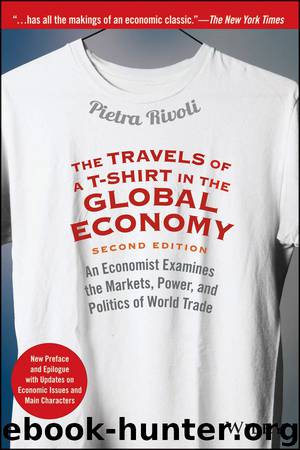The Travels of a T-Shirt in the Global Economy: An Economist Examines the Markets, Power, and Politics of World Trade. New Preface and Epilogue with Updates on Economic Issues and Main Characters by Pietra Rivoli

Author:Pietra Rivoli
Language: eng
Format: mobi
ISBN: 9781118950142
Publisher: Wiley
Published: 2014-11-09T14:00:00+00:00
Making Deals and Making Exceptions
The first groans of the weavers came shortly after World War II, as cheap Japanese cotton goods took the lead in the race to the bottom. Though official U.S. policy was to open trade with Japan to encourage prosperity and thus stave off the Communist threat in Asia, the mill owners in both New England and the South felt a more immediate threat from the growing imports from Japan than they did from the Communists. The American Cotton Manufacturers Institute (ACMI) announced that a crisis was at hand:
We are face to face with a life or death question of whether our own government will stand idly by and permit low-wage competition from Japan to seriously cripple our industry. Must there be closed mills and breadlines before the administration in Washington concedes the possibility of irreparable damage to our industry?8
In order to quiet the groans and especially to advance its broader trade-liberalizing agenda, the Eisenhower administration persuaded Japan to ‘‘voluntarily'’ limit its exports of cotton textiles to the United States to allow temporary breathing room for the U.S. industry. Like much else from the 1950s, from today's perspective the Voluntary Export Restraint (VER) agreement with Japan looks charmingly simple and innocent. The agreement was merely temporary, and it dealt with just one country, Japan. Only one alphabet troop, the American Cotton Manufacturers Institute (ACMI), had been involved, and the agreement covered only a narrow range of goods. Though Eisenhower saw no choice but to toss the crumbs, he was clearly not happy about it. In his diary, he later wrote of the ‘‘short-sightedness bordering on tragic stupidity'’ of the protectionists, and worried that unless the United States opened its markets, Japan would ‘‘fall prey to the Communists.’'9
In what would become a long epic of unintended consequences, the politics served to accelerate rather than slow the race to the bottom. The VER, which limited imports from Japan, supplied not so much protection for the U.S. textile industry as an opening for Japan's competitors in the race—especially Hong Kong and Taiwan—to supply the U.S. market. In a pattern that continues to this day, the effect of plugging one hole in the dike was to increase the force of imports gushing through others. Between 1956 and 1961, imports of cotton goods from Hong Kong rose by nearly 700 percent.10
The soaring imports led to predictable cries lamenting the imminent collapse of the U.S. industry.11 In the 1960 presidential campaign, John F. Kennedy promised Governor Ernest Hollings of South Carolina that he would help. Kennedy fulfilled his promise by instituting the Short Term Arrangement on Cotton Textiles (STA) as temporary assistance to the industry. The arrangement allowed the United States to negotiate import limits from other countries—not just Japan—in cotton textiles. The effect was a bigger program, covering both more countries and more goods than the original Japanese VER.
Of course, a short-term reprieve was not enough to save the U.S. industry. In response to the continuing groans, on the expiration of the
Download
This site does not store any files on its server. We only index and link to content provided by other sites. Please contact the content providers to delete copyright contents if any and email us, we'll remove relevant links or contents immediately.
The Meaning of the Library by unknow(2565)
Six Billion Shoppers by Porter Erisman(2296)
Why Nations Fail: The Origins of Power, Prosperity, and Poverty by Daron Acemoglu & James Robinson(2289)
No Time to Say Goodbye(2113)
Red Notice by Bill Browder(2070)
The Economist [T6, 22 Thg9 2017] by The Economist(1925)
Currency Trading For Dummies by Brian Dolan(1921)
Thank You for Being Late by Thomas L. Friedman(1766)
Bitcoin: The Ultimate Guide to the World of Bitcoin, Bitcoin Mining, Bitcoin Investing, Blockchain Technology, Cryptocurrency (2nd Edition) by Ikuya Takashima(1697)
Amazon FBA: Amazon FBA Blackbook: Everything You Need To Know to Start Your Amazon Business Empire (Amazon Empire, FBA Mastery) by John Fisher(1572)
Coffee: From Bean to Barista by Robert W. Thurston(1542)
The Future Is Asian by Parag Khanna(1480)
The Great Economists by Linda Yueh(1453)
How Money Got Free: Bitcoin and the Fight for the Future of Finance by Brian Patrick Eha(1424)
Grave New World by Stephen D. King(1418)
Pocket World in Figures 2018 by The Economist(1414)
Capitalism Without Capital: The Rise of the Intangible Economy by Jonathan Haskel(1398)
The Sex Business by Economist(1382)
Cultural Intelligence by David C. Thomas(1286)
